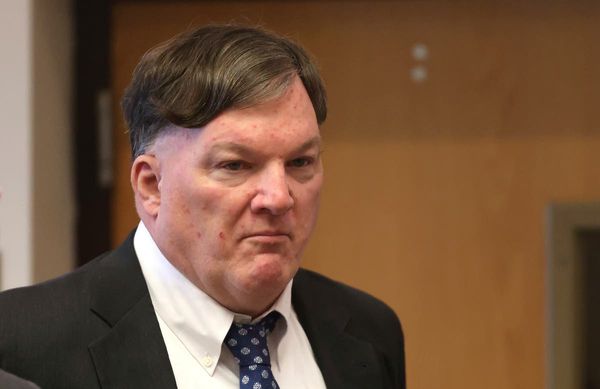
Good morning. Think of what Lee Anderson could do with £430,000: by his own dubious estimation, that’s about 1.4m nutritious meals. Sadly, we will never see exactly how many tins of beans the Conservative party’s deputy chair would buy, because, in a recording obtained by the Sunday Times, he says that’s the amount he turned down from rightwing Tory irritant and former Nigel Farage vehicle Reform UK to defect.
The money, it is alleged, would be paid as a guaranteed salary matching his MP’s income for five years if he were to lose his seat under the party’s banner. That claim is vigorously denied by Reform UK’s leader, Richard Tice, who says Anderson was merely offered “the chance to change the shape of the debate”.
We may never know. Whether or not it came with a price attached, Reform’s approach to Anderson suggests exactly where Reform UK thinks it can hurt the Conservative party: on the populist right. And after a recent bump in the polls, plenty of Tory MPs are in nervous agreement.
Today’s newsletter, with Tim Bale, professor of politics at Queen Mary University of London and author of The Conservative Party After Brexit, explains why. Here are the headlines.
Five big stories
Israel-Hamas war | Eleven more Israeli hostages have been freed from Gaza in return for 33 Palestinians held in Israeli jails, as the two sides agreed to extend the existing ceasefire by two days. Hamas said that the continuation of the ‘pause’ will continue under the same conditions after the intervention of Qatar and Egypt, mediators for the initial agreement.
Parthenon marbles | Rishi Sunak cancelled a meeting with Greek prime minister Kyiakos Mitsotakis at the last minute on Monday after his counterpart gave an interview calling for the Parthenon marbles to be returned from the British Museum. In a renewed row over the fate of the antiquities, which were taken from the Acropolis in the 19th century, Mitsotakis told reporters he was “deeply disappointed by the abrupt cancellation”.
NHS | Senior doctors reached a pay deal with the government on Monday, paving the way for the cancellation of strikes that could have hit the NHS during the usual winter crisis. The offer will mean an average 4.95% pay increase for the last three months of the financial year and some consultants seeing a 19.6% salary increase over the year.
Ukraine | The Ukrainian government is planning to change its conscription practices as it seeks to sustain fighting capacity after nearly two years of full-fledged war with Russia. Amid widespread conflict fatigue, the changes will use commercial recruitment companies to reassure conscripts they will be deployed in roles that match their skills and not simply sent to the front.
I’m a Celebrity… | The Guardian’s restaurant critic Grace Dent has told fellow contestants that her “heart is broken” as she left I’m a Celebrity … Get Me Out of Here! on medical grounds. Dent had told fellow contestants she was struggling with her time in the jungle.
In depth: ‘There’s still an enormous risk for any Tory MP thinking about defecting’

In 2020, when Nigel Farage was still the leader of the Brexit party, it did something political parties usually avoid: it changed its name. By becoming Reform UK, Farage and then-party chair Richard Tice said, they intended to “redirect our energies” with a new focus on challenging the government’s coronavirus lockdown policy.
For a long time, and as Farage stood down to be replaced by Tice, the electorate didn’t appear to care very much. But this year, with the Tories in the doldrums, Tice and his fairly anonymous cohorts have been doing better. A recent YouGov poll put their support at 10%, while of those who voted Tory in 2019, more now say they will support Reform UK (12%) than Labour (10%).
“If they get anything like 10% [in a general election], that will clearly result in Conservative MPs who might have otherwise hung on losing their seats,” Tim Bale said. “But there’s still an enormous, enormous risk for any Tory MP who might think about defecting.”
***
What do Reform UK believe?
Reform UK has sought to develop a broader slate of policies than its previous incarnation, with attempts to ride the populist wave on “wokery” and net zero as well as immigration. Perhaps calculating that leave voters in traditionally Labour seats may also be in play, it has promised tax cuts for lower-paid workers and small businesses, but no reduction in the size of the state and an ambition to cut NHS waiting lists to zero.
“They would be categorised by most political scientists as being on the populist radical right,” Bale said. “That is a designation to distinguish them from extreme right parties with origins in fascism.”
***
Could they pose a threat to the Conservatives?
Polling and research firm JL Partners identifies the pool of voters who might consider Reform UK with an avatar named “Stop the Boats Steve”. Two-thirds of this group are over 55; they rank immigration very highly as a concern and voted leave in the Brexit referendum. That is a group of about 1.9 million people who mostly voted Conservative in 2019 and might now consider Reform. “I would say that that is the floor of their possible voters,” Bale said. “If you look at Ukip winning about 4m votes - 13% of the electorate – in 2015, that suggests that their ceiling could be higher.”
If so, that might pose a huge problem for Conservatives in leave-supporting areas – and the Tories’ disastrous defeats in two byelections in October are seen by some as evidence for that argument. Reform UK won 4% of the vote in Mid Bedfordshire and 5% in Tamworth. In both seats, that was more than Labour’s margin of victory over the Conservatives. (It’s worth noting, though, that it’s unlikely that every Reform UK supporter is a vote lost to the Tories: centre-right commentator John Oxley suggests that roughly one-third of its support is from the Eurosceptic left.)
The history of the Brexit party is similarly ominous, as a book edited by Bale, The British General Election of 2019, suggested. In that election, when the Tories were pretty popular, they still lost about 25 seats that they might otherwise have won from Labour because Farage’s party was on the ballot.
Farage stood down in 317 Tory-held seats in 2019. Richard Tice has repeatedly said that he would not be standing down next year anywhere.
You might see that as a risky strategy, since it means that wavering Tories will be under no illusions that they’re getting a free hit. But there is a limit to that argument. “There will be some potential Reform supporters who, when it comes to the crunch, take heed of Tory warnings that they will split the anti-Labour vote and so help Keir Starmer into Downing Street,” Bale said. “But that prospect is a lot less worrying for many of them than Jeremy Corbyn getting his hands on the levers of power.”
***
Could Reform win seats at the next election?

It’s unlikely. Even if something like 2 million people might consider supporting Reform UK, they are spread too thinly to be decisive in the UK’s first past the post system. That might explain why Tice is so comfortable with the Tories losing: it makes the introduction of proportional representation more likely. He has said that a good result would be one with “millions of votes and a situation that guarantees PR within a couple of years” – an outcome that only looks possible if Labour needs the support of the Liberal Democrats to take power.
There is one sheep-udder-eating caveat to that analysis, currently living in the jungle. Nigel Farage, the party’s honorary president, has gone back and forth on whether he would like another crack at a seat in Westminster, but Tice has refused to rule out being replaced by his better-known predecessor. “If he were to come back as leader, the potential for the party to be a disruptor would be considerable,” Bale said. Whether it would really be worth the bother for Farage is another question.
***
What would it take for Tory MPs to defect?
Well, nobody’s done it yet. “Oblivion isn’t guaranteed,” Bale said, pointing to Douglas Carswell’s victory in a byelection and then in the 2015 general election after he defected to Ukip. On the other hand, Reform UK isn’t polling as well as Ukip was; in 2019, all of the MPs who had left their parties to form Change UK and ran under its banner lost. “Most of the evidence suggests that they would lose, so unless they thought that was going to happen anyway, [defections are] unlikely.”
In the leaked recording reported in the Sunday Times, Lee Anderson (above) sounded pretty withering about the wisdom of such a move, comparing Reform UK unfavourably to Ukip at its peak. “In general elections, in places like Ashfield, they were getting 10,000 votes,” he said. “Never knocked a door. Never dropped a leaflet. It was all about Farage.”
***
What does all this mean for the Conservatives’ future?
It suggests why figures published last week that put net migration in 2022 at a record 745,000 are so painful for Rishi Sunak. “Talking a lot about immigration is a double-edged sword, because it puts more emphasis on a record of failure,” Bale said – and energises exactly the potential switchers he wants to keep.
Some argue that this means Sunak is caught between a strategy that will keep “blue wall” seats vulnerable to Lib Dems and the leave-supporting areas that went Conservative last time. Bale is less convinced: “You have to remember that even liberal Conservatives aren’t mad keen on immigration,” he said. “What they find offputting is the tone of people like Suella Braverman.”
In the long term, though, a defeat in next year’s election and a strong showing for Reform UK will be presented by exactly that wing of the Conservative party as evidence that their approach is the right one. That could mean the Tories fully occupy the territory Reform UK is trying to control – even at the cost of the centre ground.
You might think all of this sounds like bad news for Reform UK, which could find itself with Keir Starmer in Downing Street and no angle of attack on the Tories. Bale is less sure. “I doubt many of those involved in Reform really want to see a Labour government,” said Bale. “But if it helps stir the pot in the Tory party to the ultimate advantage of those who share their populist radical right approach, then some of Reform’s movers and shakers will doubtless think, ‘So be it.’”
What else we’ve been reading

ICYMI: Nesrine Malik has written a devastatingly frank analysis on western hypocrisy in the face of the unfathomable tragedy in Gaza: “The lesson is brutal and short: human rights are not universal and international law is arbitrarily applied.” Nimo
Lisa Allardice interviews Booker prize winner Paul Lynch (above), whose novel Prophet Song imagines a fascist Ireland in the near future. Despite the book’s contemporary resonance, he is wary of being designated a political novelist: “Too often writers of political fiction believe they have the answers, they know what it is that needs to be fixed.” Archie
Former Misfits and Utopia actor Nathan Stewart-Jarrett is always looking for a challenge. He found one, in the film Femme playing a drag queen who is beaten up by a gang of homophobic young men. Catherine Bray speaks to Stewart-Jarrett in a compelling interview. Nimo
Zoe Williams has written about a newly-energised republican movement in the UK. While any change might be some way off, she writes, protests when Charles became king look like “the opening scenes of the monarchy’s disaster movie, the bit where the smouldering cigarette is dropped in the parched forest and no one notices”. Archie
Twenty-five years ago, Kip Kinkel opened fire in his school in Oregon, killing two students and injuring 25 others. The night before, he had shot both of his parents. For the New Yorker, Jennifer Gonnerman spoke to his sister, Kristin Kinkel. It is an extraordinary interview with insight into how such a tragedy could have happened and how Kristin has remained close with a sibling whose actions destroyed many lives. Nimo
Sport

Premier League | Gary O’Neil blamed VAR after a controversial penalty decision saw his side fall to a late 3-2 defeat against Fulham. Referee Michael Salisbury was sent to the screen to award a penalty after Joao Gomes brought Harry Wilson down in the box, Willian (above left) scoring his second spot kick of the game to seal all three points.
Football | After the death of former England manager Terry Venables, Darren Anderton – who played for Venables at Tottenham and starred for his England side at Euro 96 – remembers a manager who “always made you feel great”. After defeat to Germany in the semi-final, he writes, “the father figure just came out again, because that was how he was and how he treated people”.
Cricket | The England and Wales Cricket Board confirmed on Monday that it is joining the UN Sports for Climate Action Framework, becoming the first national cricketing governing body to sign up. Signatories set targets of reducing greenhouse gas emissions by half by 2030 and of reaching net zero by 2040.
The front pages

“Deal to extend truce raises hopes of dozens more hostages released” – that’s the Guardian print edition’s lead story. “Hamas demands ‘higher price’ to set soldiers free” says the Times. The Daily Telegraph has “Britain faces UN blacklist for blocking trans laws”. “Time for Bank chief who talks Britain up!” – the Daily Express doesn’t like the governor contradicting Tory economic boosterism and it probably won’t like this either, in the i: “Interest rates will stay high into 2025, say economists”. Tuesday’s Financial Times says “Turkey’s soaring exports of war-linked goods to Russia test ties with Nato allies”. “Britain’s Got To pay Walliams …” – we’ve used bold, but the Daily Mirror used yellow letters to reference the TV show that had to settle for a rumoured £1m with its former star over “leaked X-rated jibes”. “Gone too Var” – an expansion of video refereeing will “enrage” fans, the Sun reckons. “Obsessed” – the Metro leads with coverage of the trial of two 15-year-olds accused of killing trans teenager Brianna Ghey. “Poisonous” – any publicity is good publicity in the Daily Mail for Omid Scobie’s “‘vicious’ and ‘plain nasty’” book on the royals.
Today in Focus

How King Charles profits from the assets of dead citizens
An archaic custom allows the king’s estate to absorb the assets of people in the north of England who die without a will or a known next of kin. Maeve McClenaghan investigates.
Cartoon of the day | Ben Jennings

The Upside
A bit of good news to remind you that the world’s not all bad

Research published in the Lancet found that music therapy reduces agitation and the need for medication in 67% of people with dementia. To make the benefits of music more widely accessible, two groundbreaking initiatives have been launched: the first is the Music Can digital platform, which provides a free, one-stop resource to help everyone use music in dementia care for themselves and others. The website has a directory of support, playlists, music activities and advice. The second initiative is the Power of Music Fund, which will distribute a range of grants for dementia projects, including smaller grants to grassroots dementia choirs and music groups. The fund already has had a £1m contribution and there are hopes that the pot will grow to £5m.
Nicole Meissner, from Music Can, said: “These projects are vital not only to reach the people out there struggling with dementia who are not digitally savvy but also those communities where they are very well accepted or understood. It also means that dementia sufferers can have properly personalised care in a space that is still not very personalised.”
Sign up here for a weekly roundup of The Upside, sent to you every Sunday
Bored at work?
And finally, the Guardian’s puzzles are here to keep you entertained throughout the day – with plenty more on the Guardian’s Puzzles app for iOS and Android. Until tomorrow.
• This article was amended on 28 November 2023. Kip Kinkel opened fire at a school in Oregon, not Illinois as an earlier version said.







